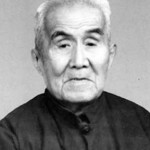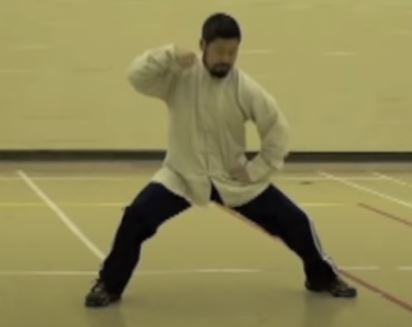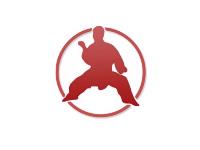Knowledge : Quotations
The grandmonk Yunxing said: During your teen aged years, you should repair yourself; in youth, you should face yourself; in adulthood, you should expand yourself; and in old age, you should complete yourself. In spring, you should be upbeat; in summer, you should raise yourself; in the fall, you should be diligent; and in winter, you should be retrospective. The four quarters of human life and four seasons of the year. Know yourself.
—That’s a lot of stuff to digest. Better get something to eat first. Philosophical words are good for the smart and the fool. The average guy needs actions such as what the next meal will be.
“Give me a lever long enough and a fulcrum on which to place it, and I shall move the world.” – Archimedes
Movement: move that does not cause your opponent to feel the impact.
Action: movement that causes the opponent to feel the impact.
Overall method should be: movement to get in (squeeze) and then action (one of the eight techniques).
All moves in taiji are repeatations of this: movement, action, movement, action, …
When you move, don’t push; when you push, don’t move.
When there is willingness and readiness, transmission is done with words and the body.
Meeting-Panel Read more
Master Xu Guicheng recalls that Grandmaster Hong Junsheng did not like the saying “Entice into emptiness” as it denotes two actions. He preferred “Withdraw is to issue.”
Master Chen has stated that any similarities between Taijiquan and other martial arts are superficial. To be unaware of this point is to risk wandering off-course on the Taiji path.
“Withdraw is to issue” is an important concept in Chen Style Taijiquan Practical Method. It is also a measurement of level of skill in this style. Here Master Chen explains a technical aspect of this skill. Read more
"Forget your perfect offering/There are cracks in everything/That’s how the light gets in" -Leonard i
“Forget your perfect offering/There are cracks in everything/That’s how the light gets in” -Leonard Cohen
When I asked Master Wang Haizhou of the Zhaobao Village what Bei Si Kou is, he said, You throw a silk (like a spider’s web) net on him. He will struggle until he cannot move any more. Then it is your time to do something.
Taiji uses a type of energy generated through spiral movements. This energy is constantly powered. Momentum is a great energy source that is abundant in everyday life. Many other martial art forms use this energy. Taiji does not.
Lian : 炼
Originally written by: Zhang Zhaoping
On the chapter on Taijiquan being agile and connected, Zhang Zhaoping quoted Zheng Manqing as saying that it is like “Swimming on land.” -Zhang Zhaoping. On Taijiquan. p. 25. Grandmaster Feng Zhiqiang said taijiquan is like “Swimming in the air.” -Chen Zhonghua
Originally written by: Zhang Zhaoping “Internal skill” is achieved within slow actions. “Effective result” must be enhanced in slow training. -Zhang Zhaoping. On Taijiquan. p. 23.
“Why do we require that the eyes follow the index finger? I.E. wherever the index finger goes, the eyes go. Simply put, this is the nurturing of the heart. -Zhang Zhaoping, On Taijiquan. p. 20.
“Zhogn Ding, to put it simply, is the placement of the center of gravity. It is also the kungfu of Sinking the Qi to the Dantian. This placement of the center of gravity of the Dantian, is eternally not easy. It is not gain or lost at an instant.”
-Liu Xiheng. On Taijiquan. p. 17.
“Center of gravity is the Zhong Ding of Taijiquan” -Zheng Manqing, On Taijiquan. p. 17.
Yang Chengpu said, “When dealing with an opponent, there are only two possible outcomes: win or lose”. -On Taijiquan p. 15.
“One mother gives birth to nine children. The nine children have nine different hearts”
p. 187, On Taijiquan; Lun Taijiquan, by Zhang Zhaoping and Du Feihu
Comments:
This quote was used in this book to reinforce the commonly held idea that “the outer appearances or forms can change but not the principles behind them”.
In my opinion based on learning and teaching experience, this is neither right nor wrong. This is irrelevant! This is irrelevant because it is not the job of persons living to talk about the separation of physical appearance and principles behind them. That job is better left to the “immortals” who can live long enough to reach that level. Normal humans (like us) have no part of that idealistic degree of competence.
As to the meaning of the direct quote above, if the nine children do not resemble in appearance neither their father nor their mother, a DNA test is required to find out the REAL reason behind that!
Tian Qiu Xin used to recite the following verses:
Since the beginning movement the spiral rises, and the force comes from the feet.
One after the other it passes through all joints, therefore all the body being a unity.
The belly is like the sea, and the form like the tide. When changing the movement, folding comes from the waist.
Although forwards and backwards the level changes, you must keep stability. Upwards and downwards go through each other, and then the force reaches the extremes.
Thanks to John Vanko for submitting this quotation.
Elbow Sticks to the Ribs
“Elbow Sticks to the Ribs” is a principle that is shared by all martial arts, not only Taijiquan. It’s a pity that most martial artists only pay lip service to this age-old aphorism. This is indeed a secret training method to higher levels of martial attainment.
Chen Style Taijiquan Practical Method regards this aphorism as a major principle to follow.
Hong’s form of taiji has no ‘rehearsal movements’ or pre-movements, its just the useful stuff. Don’t load your taiji with rehearsal movements and unimportant movements.
Internal harmonies:
Heart and Intent; Intent and qi: qi and force.
External harmonies:
Hand and foot; elbow and knee; shoulder and kua.
The Dao has no shape. Everybody lives it without knowing it.
大道无形。人在道中却不知。
strong will beat weak
Big will beat small
Technique will beat force
Gong will beat technique
Qi will beat gong
Intent will beat Qi
Longer will in the end beat the shorter. Length can be equated to strength.
Good deeds leave no traces behind; Good advice contains no blame;and Righteous calculations come without thought. Read more
—Hong Junsheng
Many people regard Taijiquan as a slow, gentle and soft art. The orginal principle, however, points to a different and more reasonable direction.
“The two hands are just two doors. The fight is done by the feet”—martial adage.
“The hand is there but not the foot. The fajin is not clever. When the hand is there, the foot is there also, the fajin is clever. When the foot is there before the hand, the fajin is beyond wonder.”—martial adage.
“The hands will take 3 years to train. The feet ten years”—Xiaowushou adage.
All movements in Taijiquan are extracted from daily life. If you don’t understand the interchanges of shun and ni, you don’t understand Taijiquan. You don’t understand life either.
—Hong Junsheng
Open: shun Close: ni Shun: the arms move towards own body. Ni: the arms move away from own body.
“Taijiquan is the method of Chanfa…”
If this is not understood, there will be no undersanding of Taijiquan.”
—Chen Xin, 16 generation Chen Taiji Grandmaster
Chanfa literally means twining method.
“When you follow the rules to the extreme, every unintentional action becomes part of the form!”
—Hong Junsheng Read more
Thursday, 15 November 2007
The shoulder cannot move sideways on its own.
It can move downwards and rotate on its seat. It must always staying right on top of the kua.
The five positions of Taijiquan are: Advance, Retreat, Look, Gaze and Central Equilibrium.
1.
Advance: move forward.
2.
Retreat: step backwards.
3.
Look: size up the opponent.
4.
Gaze: examine the oppnent.
5.
Central Equilibrium: keep the balance and not fall down.
Reserve
To excessively expose the spirit is another error that must be re- solved. To accomplish this, one must also be reserved. Read more





